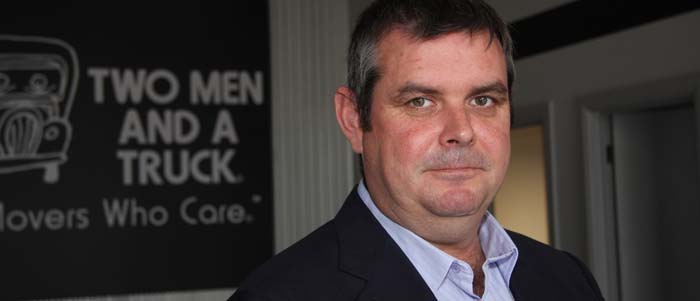More than just a man and a van. Tony Donellan is at the leading edge of what could become a revolution in the UK moving industry. Steve Jordan caught up with him to find out what it is all about.
Everyone in the moving industry is familiar with the idea of ‘a man and a van’; but ‘two men and a truck’! It sounds like a step up, and indeed it is, but if the experience in the US is anything to go by, it could easily become a great deal more.

Two Men and a Truck (TMT) was started in Michigan in the early 1980s by Mary Ellen Sheets, a single mother who wanted to give her teenage boys something to do in the school holidays. She sketched a stick man logo and put an advert in a local community magazine. The company now has more than 200 locations worldwide and a fleet of 1,200 trucks. The logo remains.
Tony Donellan, the company’s general manager and a native Australian, has been in the UK moving industry for many years. His last job was as a depot manager for Pickfords. “I had no plans to leave Pickfords, I was very happy there,” he explained, “but the opportunity with TMT came along and I liked the idea.”
The company first expanded to Europe when it opened a corporate office in Ireland in 2007 on the back of the Celtic Tiger phenomenon. The company experienced tremendous growth and was TMT’s top-performing franchise for a while until the financial crisis hit, but is still doing OK even now. Tony’s role, which he took up at the beginning of 2012, is to set up corporate operations in the UK and oversee the building of a franchise network. The first office opened on 11 May, 2012, in Hayes.
“Our plan is to get two or three corporate offices operating in the London area within the next 18 months,” explained Tony. “From there we can build the franchise network.” The intention is to aim for 50 franchises in the UK but Tony concedes that perhaps 35 is more realistic. He already has some keen interest from franchisees but the process takes around nine months to complete from an initial expression of interest.
Asked what makes him so confident that TMT can succeed in the toughest possible market where others are failing, Tony said that it is the company values and its flexibility that make the difference.
Flexibility comes from an hourly costing system so customers don’t need to pay for time they are not using. “It’s down to us to make sure we tie jobs together to make the margins,” Tony explained. “It’s hard at first but once you get some jobs coming through it becomes much easier.” Many of the jobs are booked over the phone so there’s no need for a survey. Enquiries are also taken over the Internet but the quote is only given after a proper conversation with the customer to verify the nature of the job. In practise it’s possible to make better money from a number of small jobs, properly coordinated, than from a full house move.
The company values are also at the core of everything it does. Franchisees are expected to operate within them. These include integrity, compassion, the need to have fun while doing your job, the inclusion of people from all backgrounds, the requirement to give back to the community and something called The Grandma Rule®: to treat everyone the way you would want your Grandma treated (and yes that is a Registered trade mark!).
Becoming a TMT franchisee is not easy. You will need capital to pay the rent on the premises, buying at least two trucks, and funding the operation of the business until the cash starts coming in. Tony expects breakeven to come after around 18 months and a truly profitable business after approximately three years. “It’s very hard work but it’s important that we have everything done properly right from the start,” Tony explained.
Franchisees pay 6% of income back to the master franchisor. In return they receive training in the US, support, the use of the distinctive black and white livery and the iconic stick man logo (you don’t mess with the logo), and group marketing from a central fund.
Tony said that success will come from customer service. He said that the operating procedures are robust, response times very fast, and the staff are always helpful. This has led to a 94% customer referral rate and 23% growth in the US throughout the financial crash years. “We are not interested in competing against the man and van level of service,” said Tony. “A lot of people have reservations about using them because they are notoriously unreliable. We won’t compete with them on price but we will compete on the type of job they are doing. You’d be surprised how many people are looking for something different.”
Although the company has only been operating in the UK for three months Tony said that it’s already ahead of where it expected to be. “I guess if we can make it in this economic climate, we can make it any time.”